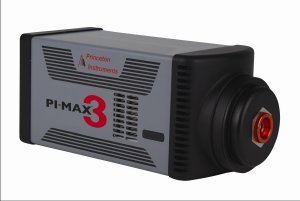Princeton Instruments (PI) is pleased to announce the addition of PI-MAX3-MG models to its popular line of intensified CCD (ICCD) cameras. The new MG models feature the exclusive “MCP Gating” technology to provide unprecedented sensitivity and gating speed combination. The new cameras are specially suited to UV-Blue applications such as PLIF imaging in combustion research.
Manjul Shah, Applications Specialist at PI states, ”Typically ICCD cameras can achieve <5 nsec gating speed using intensifiers based on multi-alkali photocathodes. However, in order to achieve fast gate speeds, additional metal under-layers may need to be added, which reduces the all important QE. On the other hand, slow gate tubes, without the use of metal under-layers, have high sensitivity but can only gate down to 200nsec. The PI-MAX3 MG is the first integrated ICCD camera to combine best of the both – QE of slow gate tubes and gating speed of <8nsec. It is ideal for time resolved UV-Blue applications using pulsed lasers where high sensitivity and fast gating are important.”

The PI-MAX 3 line features built-in SuperSynchro™ timing generator that makes setting up complex time-resolved imaging experiments easy. Researchers can use SuperSynchro to store a sequence of gate delays and widths and execute them quickly to generate time vs. intensity data with just a few clicks of a mouse. SuperSynchro also provides the lowest insertion delay on the market.
Another novel PI-MAX 3 feature, SyncMaster™ technology, helps reduce lab clutter by eliminating the need for an external timing generator. SyncMaster allows the camera to output two continuously running pulse trains to trigger pulsed lasers without interruption, or to trigger Q-switched flashlamp lasers or double-pulse lasers separately. Because the camera’s programmable gate widths and delays are generated from the same master clock, the resultant jitter is the lowest possible (typically determined by the laser jitter). The latest Gigabit Ethernet interface allows the PI-MAX 3 to be operated from distances greater than 50 meters away, important for applications such as combustion or plasma studies in which the camera must be kept at a safe distance from host computers.
PI-MAX3-MG models are available in both 1024x1024 (1024i) and 1024x256 formats. All PI-MAX 3 cameras use a windowless design for maximum light throughput. The PI-MAX3 camera also features innovative photocathode cooling for ultra-low-light or single-photon imaging as well as special readout modes for single-shot measurements and particle imaging velocimetry (PIV) applications.